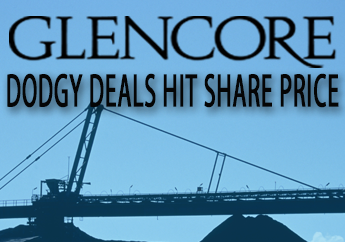Published: 14 Aug 2018

Glencore is one mining company among many announcing great profits on the back of sharply higher mineral prices since mid-2016. But unlike other major mining companies its share price is down sharply in recent weeks due to allegations of fraud and corruption.
The results Glencore released on 8 August are for the half year to end June, and are compared with the first half of 2017. Net profits are up 13% to US$2.8 billion, while Earnings Before Interest, Tax, Depreciation and Amortisation (EBITDA – a key measure of cash flow after operating expenditures – are up 23% to US$8.3 billion.
Within those figures the Australian coal operations are contributing handsomely. Australian coal EBITDA increased from US$1,326 million to US$1,585 million. Coal and oil operations in other countries bring the EBITDA figure to US$2,217m, so the Australian operations dominate.
Overall, the coal business is second only to copper in Glencore’s results.
The company claims that it has a cash margin in coal of US$44 per tonne for coal when the Newcastle thermal spot price is at US$112 per tonne. That’s a great cash profit margin in anybody’s books. The company’s net debt levels are quite low relative to the company assets – about US$9 billion of net debt relative to total assets of US$134 billion.
Nevertheless the company’s share price has plunged close to 20% in recent weeks, and that’s because of some inconvenient issues briefly mentioned in the CEO’s report. It has faced litigation from the government in the Congo, as well as being prohibited by the US from paying royalties to its business partner in those operations Dan Gertler. Bloomberg has reported that the UK Serious Fraud Office is seeking to investigate the Congo operations, while the final straw that caused the share price plunge was the US Department of Justice announcing that they are investigating the company for corruption in the Congo, Nigeria and Venezuela since 2007.
Long before Glencore became a public company it was mostly known for a business model based on operating in countries with weak governance. But it is becoming increasingly difficult to avoid public scrutiny over that. Investor appetite for the risks involved appears to be declining.